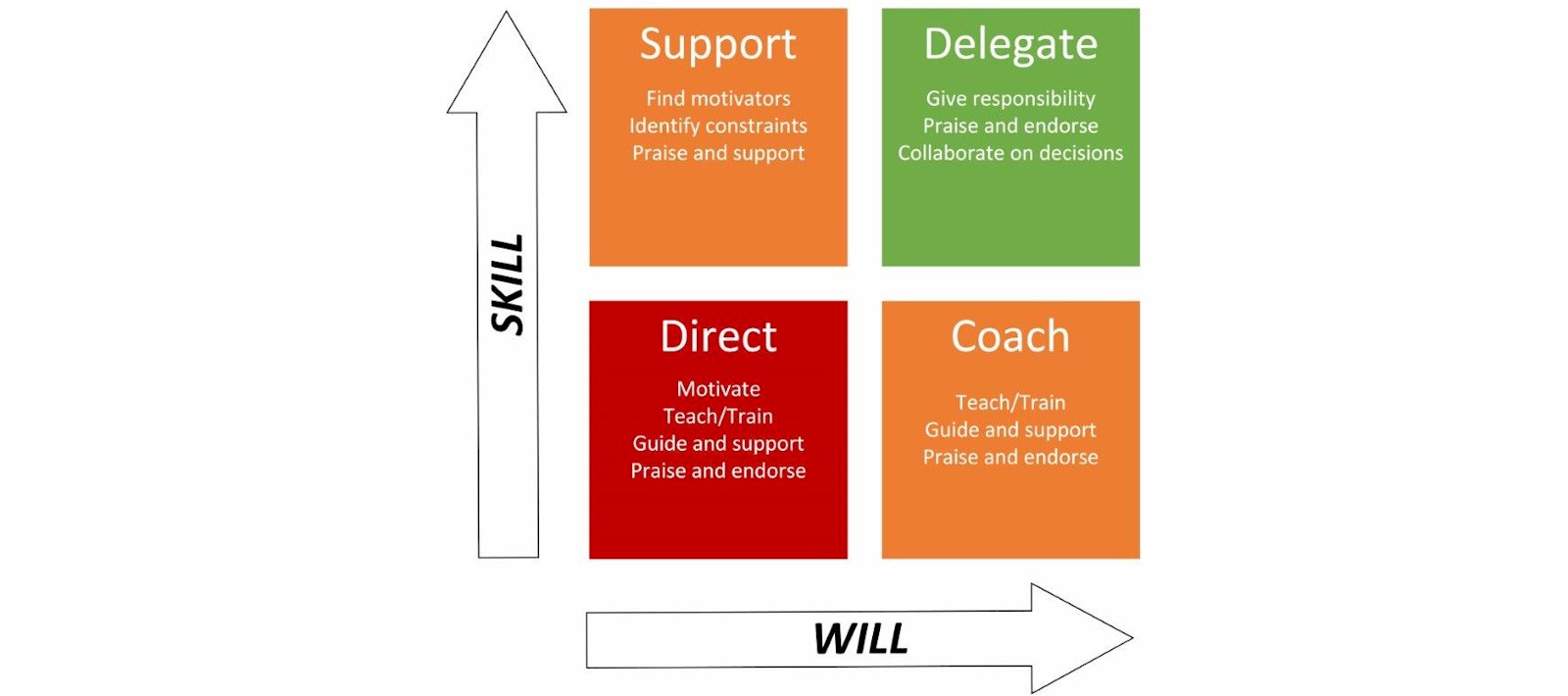Whether you are a busy business owner or a Manager who is used to the doing, you are asking when should I delegate work? If you are going to continue growing your business successfully, or step-up and lead, then you must be able to delegate effectively. A business cannot scale up and grow if its owner is making all the decisions or doing all the work. Equally a team cannot grow and perform at its best if the Manager is doing likewise.
What is delegation?
“Delegation is the assignment of authority to another person in order to carry out specific activities. It is the process of distributing and entrusting work to that other person” (Wikipedia). The art of delegating is considered a core concept of leadership.
Examples
Two examples will illustrate this. One is anecdotal, the other describes the experiences of a senior executive in the Coca-Cola company.
Example 1
At a very academic school, a government policy threatened the scholarship examinations, which the school had great success in and hence regarded as very important to them. The headmaster was disturbed by this and did not know what to do.
Knowing that a certain senior teacher was a very able person, he turned to him in desperation and delegated the task of saving these examinations, as he was not sure what to do. The teacher was given complete autonomy and every encouragement to succeed. He was protected from overt and subtle sabotage by others at the school and, after some time, the task was very successful and the scholarship examinations continue to this day.
Example 2
At Coca Cola, Jack Stahl had a long career, culminating in being president of that company, before his move to Revlon in 2002. Early in his career, he was delegated the task of preparing a prospectus. Being given the trust and autonomy to fulfill this task, he benefited from high professional development. Mr. Stahl described the delegation, which was truly effective, both for the task and for himself in his subsequent career (Jack Stahls).
The difference between delegation and job duty
At first sight, delegation may be seen as nothing more than assigning or allocating tasks or jobs. To a large degree, delegation is just that. However, hiring someone as a janitor with clearly outlined tasks is not the same as delegation. There are core activities associated with a role. Delegation usually entails some degree of empowerment of the person to whom a responsibility has been additionally assigned.
Why delegation is important?
As described earlier, without delegation an organisation cannot grow. Genuine and effective delegation means giving authority for some organisational functions, which the overall manager or owner cannot possibly have time to contend with. With delegation, authority is spread among others and helps create a more effective organisation. Moreover, it leads to better decision making as people closer “to the action” can understand the full context of decisions. Decisions are also made faster, since staff do not need to wait for a Senior Manager to be available. Simply put, it spreads the workload out more evenly reducing decision making bottle necks. Finally, and equally importantly, it can improve an organisations culture by improving trust, staff empowerment, and teamwork.
When to delegate work
You should delegate work when:
- Tasks that are time-consuming but not strategic. Question to ask yourself “is this an operational activity?”
- Tasks that others in your team can do better. Ask yourself, “Who has the better job, technical, or relationship experience to do this better?”
- Tasks that are good opportunities for other team members' professional development. Ask yourself, “who is ready to learn from this activity?”
When not to delegate work
- When the team is overloaded; that is the time to get new temporary or permanent staff. Or prioritize!
- Tasks for which your team does not have the skills required.
- Activities that require decisions on important matters like governance, very important legal and financial matters.
- Crises, unless you have an extremely able staff member who can handle it, and you are not sure how to proceed. Example 1 illustrates this.
- Sensitive and personal matters, which include the counselling and disciplining of staff.
- Tasks that are strategic and are the natural province of the leader.
- Things that can be done more swiftly by the delegator (unless the second or third bullet points above apply!)
Skill vs Will: Who to delegate to
Situational experience, trust, and technical competency has a lot to do with delegation decisions when assigning such tasks. Clearly someone new to the team will require a certain level of direction, coaching or support when starting out. When delegating new tasks to them, a leader needs to take a considered approach. Clearly you would not delegate critical, complex, or crisis tasks to a new or inexperienced staff member. Sink or swim is not a strategy, it is just setting them up to fail.

Low skill or low will
So, for a newbie you first need to know what their skill levels and ability to handle new situations is like, and they need to understand how you and the organisation operate. By first giving direction and oversight you can learn about them through observation. As their confidence and trust grows, so does their will to do the work. Then you can start identifying more complex tasks to assign to them, as they grow into the role. As long as you are not doing the work yourself, over time they will need less diretion or support from you.
High skill and high will
In contrast, more experienced team members are much better placed to take on new or additional responibility. They have both the skill and will to successfully carry out more complex tasks or decisions. They know better how the organisation operates and what will be required. As leader, you can therefore trust them with higher levels of autonomy. All based on your understanding of their capability and the level of support they will need. The skill-will delegations matrix provides context for this.
A word of warning: If you find yourself constantly delegating work to the same person then you need to start finding development opportunities for others in your team. There are clear risks if you find yourself doing this. First, you could burn out a top performer and cause them to leave. Secondly, it could be perceived as you picking favourites which can demotivate others in your team. Lastly, you are also increasing the reliance on one or two individuals in your team which is unsustainable.
Delegating work effectively: Checklist
Delegation must be done properly. Here are some principles for effective delegation.
- First, identify when you should delegate tasks.
- Next, know your staff well enough to pick the right person for the job.
- Once you've selected your delegate, you motivate them. Explaining the need and why you think they are the best person to do this.
- Be clear about what is to be done.
- Give the person to whom you've delegated the task your fullest support.
- Must make sure they report to you on progress. Advise them how you would like this.
- Finally, and this is very important, show appreciation with progress, and when the task is completed.
Barriers to delegation
Earlier we have outlined the importance of good delegation and given successful examples. You may wonder what the symptoms are of poor delegation. There are times when we all struggle to delegate tasks that we should. These do require us to take a good look at our own behaviours, assumptions, and insecurities to identify if we in fact, could be the cause!
Identifying and removing barriers to delegating work
- Do you resent the idea of someone else getting credit? What comes around goes around. A leader who gives credits where it is due becomes trusted, respected, and followed! A leader who does not is resented.
- Fear of burden. You may feel the team is already over worked and do not want to burden them with extra workload. But have you asked them?
- Fear of increasing team stress. The idea of more responsibility can be perceived as adding stress to the team and they will not be able to handle it. It is usually just the opposite, if you delegate effectively the team will feel greater trust and empowerment, and stress is reduced if they know you have their back.
- You can do it quicker yourself. This might be the case the first few times, but is it something you should be doing? Think longer term. Use it as a development opportunity for your staff and free yourself up more to do your actual job of managing and leading!
- You enjoy doing it. Again, think longer term. Is this an effective use of the leader’s time?
- Your boss will think you are shirking responsibility. Not if you have a good reason to delegate, and remember, you are still ultimately accountable for what your team produces!
- Fear of loss of control. This fear can be easily resolved if you follow the checklist. Delegate clearly, and make sure you get feedback and updates. Effective delegation is not about blindly passing off decisions to others.
Conclusion
In this article we have defined delegation, provided examples, and given you some guiding principles for this crucial part of leadership. The is article aimed to answer your question on "when should I delegate work". We also hope it has made you realise the importance of delegating, and given you the key principles to benefit you in your own enterprise. Also, check out our article on the top sought after management skills which includes empowerment as in hot demand.
Recommended reading:
The Art of Delegation - CC Malone
Effective Delegation of Authority - H Osman
Clockwork: Design Your Business to Run Itself - M Michalowicz (Audio Book)



